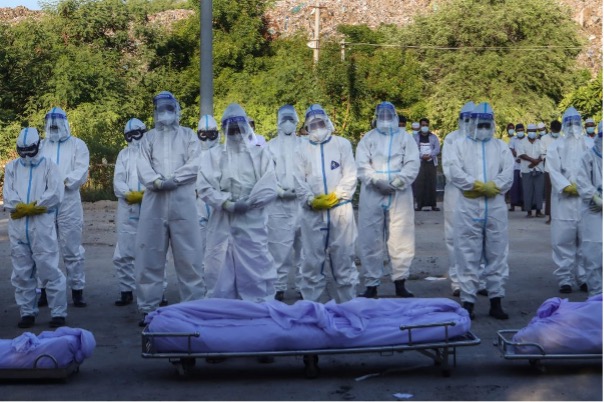Table of Contents
20th July 2021
Following on from previous pieces on Covid in Myanmar, the following piece from Frontier gives a human perspective on how it is impacting people.

With hospitals in Myanmar empty of pro-democracy medical staff and coronavirus cases surging nationwide, volunteers are going house-to-house to collect the fast-rising number of victims dying in their homes.
Early each morning, Than Than Soe’s phone starts ringing with requests from family members of those who have died in the commercial capital Yangon.
She writes the name, address and contact number of the victim in a ledger and dispatches a team to their home.
“We are running our service without resting,” she told AFP at the bustling office of her volunteer group.
Every day “my team is collecting between 30-40 dead bodies… I think other teams will be the same as us”.
“Sometimes, there are two dead bodies in one house.”
Hospitals around the country are empty of both doctors and patients because of a long-running strike against the military regime that seized power in February.
Widespread anger at the coup — and fear of being seen to cooperate with the regime — is also keeping many away from military-run hospitals, leaving volunteers to source precious oxygen and bring the dead for cremation.
Sann Oo, who began working as a volunteer driver when the pandemic’s first wave hit Myanmar last year, says a typical working day is now at least 13 hours long.
“We used to send patients to hospitals,” he told AFP. “We asked patients ‘which hospital do you wanna go to?’
“But now it’s different. When we receive incoming calls, we have to ask, ‘Which cemetery?’”
The junta reported almost 5,500 cases on Saturday, up from around 50 per day in early May, but analysts say the true toll is likely much higher.
At the house of one victim, Sann Oo and the team strap the corpse onto a stretcher, cover it with a blanket and navigate the narrow wooden staircase down to the street.
They carry the stretcher to the van while another volunteer hits a gong used in Buddhist funeral rites.
As they arrive at the Kyi Su crematorium there are at least eight other ambulances already parked outside.
The words “Dead Body Carrier” adorn the windscreen of one of the vehicles.
‘Only bad news’
Medical workers who were at the forefront of Myanmar’s Covid-19 response before the coup have been targeted after leading early mass protests against junta rule.
Top health officials, including the head of Myanmar’s vaccination programme, have been detained and hundreds of others have gone underground to avoid arrest.
Last week, the State Administration Council called for doctors and nurses to volunteer for the Covid-19 effort, admitting it was facing “difficulties” in controlling the surge.
State media reported Saturday that authorities were rushing in oxygen supplies from neighbouring Thailand and China.
The UN’s special rapporteur for human rights in Myanmar last week warned the country was at risk of “becoming a Covid-19 super-spreader state”.
Than Than Soe said two of her team had tested positive since the recent spike, and one has died.
“Everything I hear is only bad news,” she added.
One man her office helped called his brother at the Kyi Su cemetery, where his mother was about to be cremated, and asked him to wait for the ambulance bringing their father, who had just died.
“I want them to meet one last time,” he sobbed into the phone.
For Than Than Soe, such scenes have become constant.
“Sometimes I don’t pick up the phone and don’t want to answer calls,” she said.
“It’s not because I don’t want to do my duties… it’s because I’m suffering a lot of pain.”
Source Frontier 20th July 2021.
Please share this article so that others can discover The BFD









